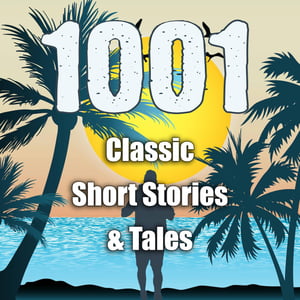THE JELLYBEAN by F.SCOTT FITZGERALD
1001 Classic Short Stories & Tales
Jon Hagadorn
4.2 • 1.1K Ratings
🗓️ 18 May 2025
⏱️ 48 minutes
🧾️ Download transcript
Summary
The story was written as a sequel to "The Ice Palace," and Clark Darrow appears in both. The omniscient narrator, who ensures that close observation is paid to Powell's story, draws in the reader. The opening line – "Jim Powell was a Jelly-bean"- labels the protagonist immediately, and as a character he remains within the stereotype Fitzgerald indicates, though he almost manages to break free.
The history of Powell's life presents a tale of a family fallen on hard times. Powell is humiliated by the whisperings of the social set and chooses notoriety over civility. He fights for his country aged eighteen and returns at twenty-one with ill-fitting, unfashionable clothes which symbolize how he does not "fit" in society.
Powell contrasts with the attractive and dynamic Clark Darrow. He is unsure of whether to go to the party Darrow invites him to, but Nancy Lamar, with her "mouth like a remembered kiss," entrances him. The simile is a romantic one, as although Powell has always known Nancy, she has never been attainable to him.
Its a small town story with all its class divides and Fitzgerald builds some very believable caracters around which his story evolves.
Transcript
Click on a timestamp to play from that location
| 0:00.0 | Welcome back, everyone to one thousand one classic short stories and tales. |
| 0:17.8 | This is your host and storyteller, John Haggardorn. |
| 0:22.4 | It's been a long time since we did a story by F. Scott Fitzgerald, and we're going to do one from his collection of short stories |
| 0:27.0 | called Tales of the Jazz Age. This one was written in 1920. Here's a little background on |
| 0:33.4 | Francis Scott Key Fitzgerald. born 1896, died 1940. |
| 0:40.1 | He was an American author of novels and short stories, born in St. Paul, Minnesota, and raised in an Irish middle-class family. |
| 0:47.4 | He's best known for his masterpiece, The Great Gatsby, and Tender is the Knight. |
| 0:52.3 | He was named after his famous second cousin, Francis Scott Key, |
| 0:56.9 | who penned the Star-Spangled Banner. His prolific short stories tend to center around the |
| 1:02.6 | promise of youth, followed by the effects of age and despair. Fitzgerald was considered one of the |
| 1:08.6 | best authors of the 20th century, |
| 1:15.4 | a leading voice for the lost generation of the 1920s and the Jazz Age. |
| 1:20.9 | He would be one of the change makers that broke literature out of the Gilded Age and into the new age of literature, along with Hemingway and others. |
| 1:24.9 | He spent a great deal of his youth in Buffalo, New York, |
| 1:28.5 | then moved to New Jersey to attend Princeton University. He dropped out and enlisted in the U.S. Army in 1917 on the brink of |
| 1:35.0 | World War I, but he did not see combat. He became an officer, married, and after being decommissioned, |
| 1:41.6 | went to New York City to pursue his literary career. |
| 1:50.0 | This Site of Paradise was his first successful novel, allowing him to travel extensively in Paris and the French Riviera in the 1920s, creating the backdrop for his most widely acclaimed work, |
| 1:56.0 | the Great Gatsby, which was published in 1925, also giving him a lot of exposure to the Jazz Age. |
| 2:03.2 | He befriended great authors such as Ernest Hemingway during this time. |
| 2:07.3 | He became a Hollywood scriptwriter later in his life, |
| 2:10.2 | had a very interesting career, and his works are still remembered today. |
... |
Please login to see the full transcript.
Disclaimer: The podcast and artwork embedded on this page are from Jon Hagadorn, and are the property of its owner and not affiliated with or endorsed by Tapesearch.
Generated transcripts are the property of Jon Hagadorn and are distributed freely under the Fair Use doctrine. Transcripts generated by Tapesearch are not guaranteed to be accurate.
Copyright © Tapesearch 2026.

